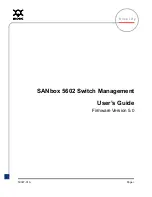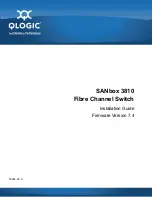
*
Troubleshooting
Symptom
Corrective Steps
PD-3501G
does not
power up
1. Verify that a reliable power cord
is used.
2. Verify that the voltage at the
power inlet is between 100 and 240
VAC.
3. Remove and re-apply power to
the device and check the indicators
during power up sequence.
The PD
does not
operate
1. Verify that the PD-3501G detects
a PD.
2. Verify that the PD is designed for
PoE operation.
3. Verify that you are using a
standard Category 5/5e/6, straight-
wired cable, with four pairs.
4. If an external power splitter is in
use, replace it with a known-good
splitter.
5. Ensure input Ethernet cable is
connected to the DATA IN port.
6. Verify that the PD is connected
to the Data & Power port.
7. Try to reconnect the same PD
into a different PD-3501G. If it
works, there is probably a faulty port
or RJ45 connection.
8. Verify that there is no short over
any of the twisted pair cables or
over the RJ45 connectors.
The end
device
operates,
but there
is no data
link
1. Verify that the port indicator on
the front panel is continuously lit.
2. If an external power splitter is in
use, replace it with a known-good
splitter.
3. Verify that for this link, you are
using standard UTP/FTP Category 5
straight (non-crossover) cabling,
with all four pairs.
4. Verify that the Ethernet cable
length is less than 100 meters from
the Ethernet source to the
load/remote terminal.
5. Try to reconnect the same PD
into a different PD-3501G. If it
works, there is probably a faulty port
or RJ45 connection.
Port Connectivity
Indication
Ethernet
Cat
.
5
Cable
Terminal
Figure 1: Connecting the PD-3501G
Indicators
Port LED
Indicated Behavior
Yellow On
Power is on (power is active)
Green On
A remote terminal is connected
Green Blinking
Overload state or short-circuit
Specifications
Environmental Specifications
Mode
Temperature
Humidity
Operating
0 to 40°C
32 to 104°F
10 to 90%; (no
condensation
allowed)
Storage
-20 to 70°C
-4 to 158°F
10 to 90%; (no
condensation
allowed)
Electrical Specifications
Input Voltage
100-240 VAC (50/60 Hz)
Maximal Input Current
0.43 Ampere
Guaranteed Output power
15.4 Watts
Nominal Output Voltage
48VDC
Ethernet Interface
Input (DATA IN)
: Ethernet
10/100/1000Base-T
RJ45 female socket
Output (DATA & POWER
OUT)
: Ethernet
10/100/1000Base-T, plus
48VDC
RJ45 female socket, with
DC voltage on wire pairs,
4-5 (+) & 7-8 (-).
Functions and Features
The PD-3501G Power over Ethernet (PoE) is a Single Port
Midspan that offers a compact and cost effective power solution
for IP phones, WLAN access points, network cameras and other
IP terminal installations.
The PD-3501G converts AC power to 48VDC power is then
provided over the Ethernet cable.
The PD-3501 supports 10/100 Mbps pass through
data rates while the PD-3501G supports up to
11011101111Mbps pass through data rates.
The single port PD-3501G can be powered via universal
AC input.
PD-3501G EMC Compliance
:
FCC Part 15 class B and EN55022 class B
EN55024
VCCI
PD-3501G Safety Compliance:
UL/cUL per 60950-1 2
nd
Ed.
GS mark
Preliminary Steps
Ensure that AC power is applied to the PD-3501G,
using an operational AC cable with an appropriate
ground connection.
Ensure that output Ethernet cable is connected to the
DATA & POWER OUT port.
Verify that power ready Ethernet compatible device is
connected.
WARNING
Do not use cross over cable between the PD-3501G output
port and the load device
Installation
The PD-3501G can be placed on a desktop.
:
Before placing the PD-3501G:
Do not to cover PD-3501G or block the airflow to the
PoE with any foreign objects. Keep the PD-3501G away
from excessive heat and humidity and free from
vibration and dust.
Ensure that the cable length from Ethernet network
source to the terminal does not exceed 100 meters
(330 feet). The PoE is not a repeater and does not
amplify the Ethernet data signal.
Use a splitter if desired; ensure that the splitter is
connected close to the terminal and not on the
PD-3501G!
No “on-off” switch exists; simply plug the PD-3501G into
an AC power source.
Installing the Unit
Refer to Figure 1.
1. Connect the PD-3501G to an AC outlet (100 - 240VAC), using
a standard power cord.
2. Connect the DATA IN jack (input) to the remote Ethernet
network switch's Patch panel and the DATA & POWER OUT jack
(output) to the terminal.




















